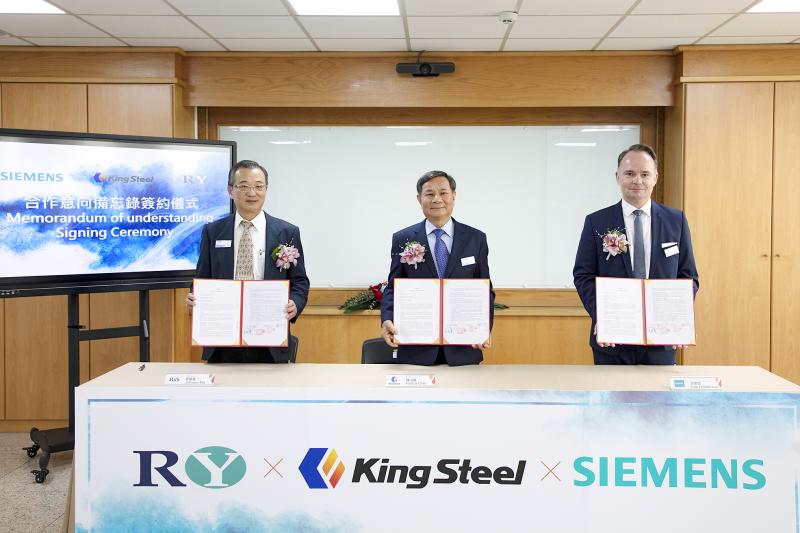King Steel Machinery Co (鉅鋼機械), Siemens Ltd Taiwan and RuhYih Automation Co (如億自動化) on Thursday last week signed a memorandum of understanding in Taichung, aiming to foster knowledge exchange and technology sharing, while developing comprehensive digital integration and smart production solutions for local industry.
King Steel, based in Taichung, is the world’s largest ethylene-vinyl acetate (EVA) foam injection molding machine manufacturer, while Siemens Digital Industries is an innovator and technology leader in industrial automation and digitization, and RuhYih Automation, also based in Taichung, is an expert in control system integration technology.
The three companies hope that the strategic partnership will enable them to develop plastic and rubber multi-injection systems and multi-station injection molding machines based on Open Platform Communication Unified Architecture standards, which would be used in shoe and bicycle manufacturing to help push the two industries toward smart manufacturing, the companies said.

Photo courtesy of King Steel Machinery Co
The partnership would extend to all aspects of business, technology and marketing to meet customer needs in the industry 4.0 era, they said.
“For more than 40 years, King Steel has focused on research and innovation to meet customers’ process upgrade needs by developing the world’s first runnerless EVA foam molding machine, a dual injection system with twin sets of two injectors and a dual-color automatic injection molding machine to satisfy the market’s needs,” King Steel chairman Francis Chen (陳法勝) said in a statement.
“Having observed the industry’s demand for digital transformation and smart manufacturing, we have invited Siemens and RuhYih Automation to jointly plan and develop next-generation smart machinery,” Chen said. “I believe that this cooperation will establish a solid foundation for developing smart factories.”
Tino Hildebrand, general manager of Siemens Ltd Taiwan’s digital factory, process industry and drive technology division, said that as the shoe and bicycle industries require digital transformation, Siemens is honored to cooperate with King Steel and RuhYih Automation to develop a digital and smart manufacturing environment for the industries.
Siemens would introduce its digital integration and smart production solutions, combined with cloud technology and automated applications, to optimize production line operations and achieve effective smart integration, Hildebrand said, adding that the three companies aim to work together to create a win-win-win situation.
“In light of the vigorous development of industrial automation systems, companies need factory equipment to be integrated with control and information systems,” RuhYih Automation president Johnson Ma (馬國書) said.
With Siemens’ complete product portfolio for digital industry and RuhYih’s years of expertise in the automation industry, they can assist customers in building the most efficient industrial automation systems, Ma said.
Moreover, the memorandum of understanding would provide the three companies with an opportunity to learn and communicate with each other, and their collaboration would help enhance the local industry’s competitiveness in automation and make it more in line with international standards, he said.

LIMITED IMPACT: Investor confidence was likely sustained by its relatively small exposure to the Chinese market, as only less advanced chips are made in Nanjing Taiwan Semiconductor Manufacturing Co (TSMC, 台積電) saw its stock price close steady yesterday in a sign that the loss of the validated end user (VEU) status for its Nanjing, China, fab should have a mild impact on the world’s biggest contract chipmaker financially and technologically. Media reports about the waiver loss sent TSMC down 1.29 percent during the early trading session yesterday, but the stock soon regained strength and ended at NT$1,160, unchanged from Tuesday. Investors’ confidence in TSMC was likely built on its relatively small exposure to the Chinese market, as Chinese customers contributed about 9 percent to TSMC’s revenue last

With this year’s Semicon Taiwan trade show set to kick off on Wednesday, market attention has turned to the mass production of advanced packaging technologies and capacity expansion in Taiwan and the US. With traditional scaling reaching physical limits, heterogeneous integration and packaging technologies have emerged as key solutions. Surging demand for artificial intelligence (AI), high-performance computing (HPC) and high-bandwidth memory (HBM) chips has put technologies such as chip-on-wafer-on-substrate (CoWoS), integrated fan-out (InFO), system on integrated chips (SoIC), 3D IC and fan-out panel-level packaging (FOPLP) at the center of semiconductor innovation, making them a major focus at this year’s trade show, according

DEBUT: The trade show is to feature 17 national pavilions, a new high for the event, including from Canada, Costa Rica, Lithuania, Sweden and Vietnam for the first time The Semicon Taiwan trade show, which opens on Wednesday, is expected to see a new high in the number of exhibitors and visitors from around the world, said its organizer, SEMI, which has described the annual event as the “Olympics of the semiconductor industry.” SEMI, which represents companies in the electronics manufacturing and design supply chain, and touts the annual exhibition as the most influential semiconductor trade show in the world, said more than 1,200 enterprises from 56 countries are to showcase their innovations across more than 4,100 booths, and that the event could attract 100,000 visitors. This year’s event features 17

Hon Hai Precision Industry Co (鴻海精密), which assembles servers for Nvidia Corp, yesterday said that revenue last month rose 10.61 percent year-on-year, driven by strong growth in cloud and networking products amid continued front-loading orders for artificial intelligence (AI) server racks. Consolidated revenue expanded to NT$606.51 billion (US$19.81 billion) last month from NT$548.31 billion a year earlier, marking the highest ever in August, the company said in a statement. On a monthly basis, revenue was down 1.2 percent from NT$613.86 billion. Hon Hai, which is also a major iPhone assembler, added that its electronic components division saw significant revenue growth last month, boosted